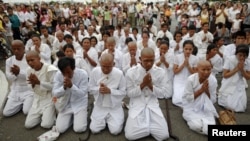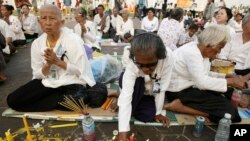BANGKOK, THAILAND —
The passing of Cambodia's former King Norodom Sihanouk has ended an ambitious and controversial era for an influential monarch. A mixed legacy remains from a king who guided his country to independence, but also aligned himself with the notorious Khmer Rouge.
Sihanouk was chosen by France in 1941 to be a puppet leader for its colony.
The young king became a unifying force pushing for independence, however, which he achieved in 1953. He then abdicated his throne for politics and effectively served as the country’s ruler for the next 17 years.
Milton Osborne is a visiting fellow at Sydney's Lowy Institute and an author of two books on Sihanouk.
"In Cambodia, there's something of a belief that the period of Sihanouk time, as it's referred to in Cambodia, was a sort of golden age. People tend to forget the period when he was ready to unleash fearsome pursuit of those he saw as his enemies," said Osborne.
Khmer Rouge era
Those enemies included Cambodia's communists who would later become the Khmer Rouge.
During the Vietnam war, Sihanouk failed to stop Vietnam's communist forces from crossing into Cambodia, leading to U.S. bombings. He was deposed in a 1970 military coup and fled into exile in China and North Korea.
Sihanouk's desire to regain power led him to align himself with his former enemies, the communists. This political shift led to foreign alliances that continued for the rest of his life.
Benny Widyono was a U.N. representative to Cambodia in the mid 1990s and author of the book "Dancing in Shadows: Sihanouk, the Khmer Rouge, and the U.N. in Cambodia."
"During that period when he was still with the Khmer Rouge, his two friends were [North] Korea and China, and he spent a lot of time there,” said Widyono.
Palace in Pyongyang
The Cambodian king’s ties to North Korea were such that leader Kim Il Sung built him a 60-room palace in Pyongyang.
He gets the treatment of a real king there in his palace there in North Korea and he even gets, has a present from the [North] Korean government to have his bodyguards. These are all very burly North Koreans, you know, very no-nonsense bodyguards. And, until all the time he has these North Korean bodyguards with him," said Widyono.
The Khmer Rouge returned Sihanouk to Cambodia where they used his image as a way to gain legitimacy. Afterward, he was placed under arrest in the palace.
During this time, Sihanouk could only watch as the Khmer Rouge went on to starve, work, and murder as many as 2 million Cambodians.
In 1979, he fled again to China as Vietnam invaded Cambodia, ending the Khmer Rouge regime.
Constitutional monarchy
United Nations-sponsored elections helped return Sihanouk to the throne under a constitutional monarchy. But he had little power, while his son, Norodom Ranariddh, shared a dual prime minister position with Hun Sen.
Sihanouk never regained the influence he once had in Cambodia, which Widyono said was a lifelong disappointment for Sihanouk.
"When I was there in Cambodia he complained to me, when I was the ambassador of the U.N., he complained to me that he is their king that reigns, but does not rule because it's really Hun Sen and Ranariddh, the two prime ministers, who have the power. So, he feels like he is always this goal of him to be the leader of a prosperous Cambodia has eluded him all his life," said Widyono.
Hun Sen ousted Ranariddh in 1997, becoming the sole power in Cambodia.
Sihanouk remembered
As King Sihanouk's power waned, and his health deteriorated, he made frequent trips to China for medical treatment. In 2004 he gave up the throne for his son King Norodom Sihamoni.
Osborne said King Sihamoni, unlike his father, has no political ambitions.
"There will never be another king who played the role that Sihanouk played. And, certainly not a king that had his political power and his interest in politics," said Osborne. "The present king is a devoted servant of his country, but he has no political role. He's determinably apolitical. So, that with Sihanouk, I think an era has gone."
Sihanouk died Monday in Beijing just days before his birthday following a long battle with cancer.
Sihanouk was chosen by France in 1941 to be a puppet leader for its colony.
The young king became a unifying force pushing for independence, however, which he achieved in 1953. He then abdicated his throne for politics and effectively served as the country’s ruler for the next 17 years.
Milton Osborne is a visiting fellow at Sydney's Lowy Institute and an author of two books on Sihanouk.
Former Cambodian King Norodom Sihanouk
Former Cambodian King Norodom Sihanouk- Born in 1922, educated in Saigon and Paris
- Came to the throne in 1941
- Founded Non-Aligned Movement
- Was briefly overthrown during Vietnam War and fled to China
- Aligned with Khmer Rouge to oppose Vietnam's influence in Cambodia
- Returned from exile in 1991 and to the throne in 1993
- Abdicated to his son, Norodom Sihamoni, in 2004
- Had been receiving medical treatment in China since January, 2012
Khmer Rouge era
Those enemies included Cambodia's communists who would later become the Khmer Rouge.
During the Vietnam war, Sihanouk failed to stop Vietnam's communist forces from crossing into Cambodia, leading to U.S. bombings. He was deposed in a 1970 military coup and fled into exile in China and North Korea.
Sihanouk's desire to regain power led him to align himself with his former enemies, the communists. This political shift led to foreign alliances that continued for the rest of his life.
Benny Widyono was a U.N. representative to Cambodia in the mid 1990s and author of the book "Dancing in Shadows: Sihanouk, the Khmer Rouge, and the U.N. in Cambodia."
"During that period when he was still with the Khmer Rouge, his two friends were [North] Korea and China, and he spent a lot of time there,” said Widyono.
Palace in Pyongyang
The Cambodian king’s ties to North Korea were such that leader Kim Il Sung built him a 60-room palace in Pyongyang.
He gets the treatment of a real king there in his palace there in North Korea and he even gets, has a present from the [North] Korean government to have his bodyguards. These are all very burly North Koreans, you know, very no-nonsense bodyguards. And, until all the time he has these North Korean bodyguards with him," said Widyono.
The Khmer Rouge returned Sihanouk to Cambodia where they used his image as a way to gain legitimacy. Afterward, he was placed under arrest in the palace.
During this time, Sihanouk could only watch as the Khmer Rouge went on to starve, work, and murder as many as 2 million Cambodians.
In 1979, he fled again to China as Vietnam invaded Cambodia, ending the Khmer Rouge regime.
Constitutional monarchy
United Nations-sponsored elections helped return Sihanouk to the throne under a constitutional monarchy. But he had little power, while his son, Norodom Ranariddh, shared a dual prime minister position with Hun Sen.
Sihanouk never regained the influence he once had in Cambodia, which Widyono said was a lifelong disappointment for Sihanouk.
"When I was there in Cambodia he complained to me, when I was the ambassador of the U.N., he complained to me that he is their king that reigns, but does not rule because it's really Hun Sen and Ranariddh, the two prime ministers, who have the power. So, he feels like he is always this goal of him to be the leader of a prosperous Cambodia has eluded him all his life," said Widyono.
Hun Sen ousted Ranariddh in 1997, becoming the sole power in Cambodia.
Sihanouk remembered
As King Sihanouk's power waned, and his health deteriorated, he made frequent trips to China for medical treatment. In 2004 he gave up the throne for his son King Norodom Sihamoni.
Osborne said King Sihamoni, unlike his father, has no political ambitions.
"There will never be another king who played the role that Sihanouk played. And, certainly not a king that had his political power and his interest in politics," said Osborne. "The present king is a devoted servant of his country, but he has no political role. He's determinably apolitical. So, that with Sihanouk, I think an era has gone."
Sihanouk died Monday in Beijing just days before his birthday following a long battle with cancer.





